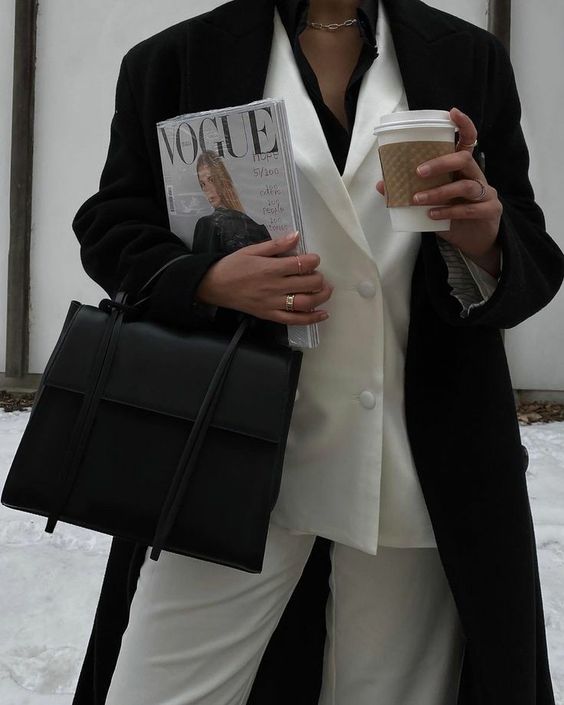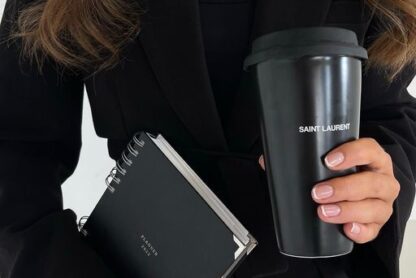When I ask my students what their dream fashion career is, I often hear answers like designer, stylist, buyer or merchandiser, editor/writer, and PR/marketing manager. I understand why because they are all very exciting and interesting careers. But the industry offers so much more career opportunities.
What’s Fashion Law: how to work in fashion with a degree in law
It’s common to think of fashion jobs as those that deal with clothes all the time. From the outside, we see runway shows and beautiful pictures in magazines, but on the inside, it’s a far less glamorous fashion world than it seems. The industry doesn’t rely only on creative roles to run successfully. It also needs professionals who deal with numbers and finances, accounting, business operations…and lawyers.
This is great news for you if you are studying or graduated in law. Think there are no opportunities out there for you in the fashion world.
There are two main routes here:
You have a degree in law and you want to do something completely unrelated to fashion like becoming a buyer, stylist, or editor. Some of my friends studied law and now work as buyers so it’s possible.
Option B: You have a degree in law and you want to work in the legal department of your favorite fashion brands.
Option B is for sure the smooth path to pursue. You don’t need to attend an additional fashion law course, and can easily break into the industry with your super-hard law degree.
As you might imagine working as a lawyer or in the legal department of a fashion brand means being one of those professionals who work behind the scenes. So, not under the spotlight as designers, editors, or stylists. If working on the business side of the industry and dealing with lots of paperwork and negotiations don’t scare you, then it may be just the career for you.
Did I just spike your curiosity and you are interested in learning about the exciting role of a fashion lawyer? Let’s find out then what their responsibilities are and how to become a fashion lawyer, what skills you need, what to study, and where to look for job opportunities.
To begin, let’s understand why fashion needs lawyers, and what are the legal issues in the fashion industry.
To put it simply, fashion law deals with all the legal issues that impact the fashion industry. The purpose of every fashion brand is to sell products, and they undergo a long journey from the idea of the designer to their final creation to ending up in your closet. Therefore, fashion lawyers must ensure adequate legal protection throughout the entire life of a garment.
Any fashion business that creates products needs the protection of copyright and intellectual property. This includes fashion designers, retailers, distributors, manufacturers, modeling agencies, etc.
One of the biggest legal issues in the fashion industry is product counterfeit. With so many copycat versions of shoes, bags, and clothes, there is a need for stringent copyright, trademark, and intellectual property protection to prevent these fraudulent violations and infringements. For example, luxury houses like Louis Vuitton, Chanel, and others see their logo used illegally on products trying to pass for original designs. It can also happen that a product mimics partly or totally the design of another brand that invented it first. So if you see a very similar item – even if it doesn’t bear a fake logo -, it is called a “knock off”, and we are still dealing here with design piracy and copycat litigation that calls for legal protection for fashion designers or other stakeholders as mentioned above.
Of course, there are different segments in the field of fashion law that are taken care of by a fashion lawyer, including:
Intellectual Property Protection:
- Manage trademarks and copyrights related to the company’s designs, logos, and other intellectual property.
- Combat counterfeit products and unauthorized use of the company’s intellectual property.
Employment Law:
- Advise on employment laws and handle employment-related disputes and issues.
- Create and review employment contracts and agreements, ensuring compliance with labor laws.
Operations/Production and Sustainability Compliance:
- Ensure the company complies with various regulations related to labor, manufacturing, and product safety.
- Advise on environmental and sustainability regulations related to fashion manufacturing.
Contract Management with suppliers, manufacturers, retailers, distributors
- Draft and negotiate contracts with suppliers and manufacturers to ensure a smooth supply chain.
- Manage agreements related to sourcing of materials and manufacturing.
- Handle contracts with retailers, distributors, and e-commerce platforms.
- Manage franchise agreements and concessions.
Licensing Agreements:
- Oversee contracts related to the licensing of the company’s intellectual property to third parties.
Collaboration Agreements:
- Draft and review contracts for collaborations with other fashion brands, designers, influencers, or celebrities.
- Create and review contracts with service providers like advertising agencies, marketing firms, and logistics companies.
Employment Contracts:
- Draft, review, and negotiate employment contracts and agreements, including non-compete, non-disclosure, and confidentiality agreements.
Mergers and Acquisitions:
- Handle legal matters related to mergers, acquisitions, and other corporate transactions.
Consumers and privacy:
- Managing consumer issues, data protection, and privacy matters
Litigation:
- Represent the company in any legal disputes, including intellectual property infringements, employment-related disputes, and contractual disagreements.
- Manage litigation risks by advising the company on potential legal issues and recommending preventative actions.
Lawyers of course also offer general legal advice to the company on various matters, ensuring that the company’s operations are legally sound. They collaborate with other departments to provide legal perspectives on business strategies and decisions.
To sum up the broad responsibilities and duties of a fashion lawyer, on one hand, they legally represent fashion brands and other clients, and provide them with legal advice on any issue they face with fashion designs including apparel, footwear, accessories, but also jewelry, and cosmetics. On the other hand, a fashion lawyer provides consumer protection, ensuring their rights are respected when purchasing a product. They take care of drafting and negotiating contracts and identifying and preventing legal breaches. Also, litigating and solving legal cases if the company is suing someone or is the one being sued.
Some fashion brands have their own in-house teams, while others turn to external law firms. There are also freelance fashion lawyers, but if you want to exercise independently, you need to build a name for yourself first. So it’s something harder to do at the beginning of your career.
How To Get Into Fashion Law?
What to study to become a fashion lawyer?
I often say that it doesn’t matter what degree you take at university if you want to work in fashion. You can study fashion design and become a stylist, or take a degree in business and become a fashion buyer. However, fashion law is an exception. You need to have legal knowledge. Unfortunately, this is not something you can learn by just taking an online course or transferring skills from other degrees and jobs. Although they can be useful, but cannot replace knowledge of law. Therefore, you cannot become a lawyer if you have a degree in communication, art, or marketing, or if you attended a fashion school. Though industry knowledge is a must.
Companies in any industry, including fashion, hire only qualified lawyers with a degree in law. Managing legally binding contracts, dealing with legal terms, and solving legal cases is not something you can improvise. There is simply too much at stake, such as the company’s reputation and money.
So the answer is simple: you have to study law or fashion law.
You can take any traditional law degree at a university or law school, or enroll in a fashion law institute, but you have to be sure you want to work in fashion because you will acquire industry-specific knowledge there.
I always insist on the fact that learning new things is a lifelong process, and your education doesn’t end when you graduate from university. This also concerns you as legal students (to be). Therefore, I recommend that during your studies or when you graduate, you complement your first education with an additional course. It can be a specialization in finances, merchandising, sustainability, or other areas of your interest that can be useful in your job as a fashion lawyer and open more career opportunities for you. Fashion law is a broad term and you won’t probably manage every single aspect of legal protection, hence some additional knowledge is always something nice to have.
Think as well of the type of fashion company you want to work for. For example, if it’s a retail department, then taking a course in fashion retail law can be useful. If it’s a modeling agency, then fashion modeling law can be a good add-up to your resume.
What skills are necessary to become a fashion lawyer?
As you understand, having education and skills in law is the fundamental part of becoming a fashion lawyer, but let’s take a look at other skills that are needed in this job.
Fashion industry knowledge
While it’s not necessary to attend a fashion school to become a fashion lawyer, knowing what’s happening on the business side of it is crucial. If you know what issues and challenges the industry is facing, you will be able to respond a lot better to clients’ needs. Notice that being obsessed with clothes and knowing the latest trends is not required. But you do need to understand how the industry works by following the news. Business of Fashion, for example, is a good source.
Previous experience in fashion is not required either, however, it can strengthen your application to become a fashion lawyer later on (if you have formal legal education at your back of course). It can give you many insights into the different aspects of the fashion world, which can help make a fashion-centered legal career all the more robust.
As recommended in the previous paragraph, pairing your law degree with some online courses about the business side of fashion and the history of fashion is a good idea.
Negotiation Skills
Lawyers working in any industry, including fashion, don’t spend all their days on the computer and doing paperwork. A big part of the job consists of negotiating contracts with different stakeholders. Therefore, having great negotiation skills is super important not only to make sure the company you are representing is legally protected in all the aspects, but that it also doesn’t take on clauses that could be not beneficial or that could be compromising, so your responsibility as a fashion lawyer is to build as fair and attractive contract as possible for your company.
Written and verbal communication skills
This goes hand-in-hand with the things mentioned above. Having outstanding written and verbal skills is paramount to sound convincing. You have to be very clear with all the things you say and how you say them both in your documents and your speech. It’s essential to be specific with the terms and clauses you use so that they don’t put the company in a bad position.
Look for jobs or internships in Fashion Law
If you already have experience as a lawyer working in another industry, then you can easily transfer your knowledge and skills and find a job in the fashion industry if you can demonstrate that you know the industry’s specifics and have other requested skills.
But if you are at the beginning of your career and you are still a student or you have recently completed your law studies, you should start by looking for law internships in fashion.
If you are asking yourself where to find fashion jobs and internships, as with any career in fashion if you want to work in an office, most of the jobs in fashion law are located across fashion capitals like New York, London, Milan, and Paris. So anywhere where there is an important fashion scene, lawyers are needed. So you should look for opportunities in the big cities first.
The first thing you can do is to go to the official website of the fashion brand or Group to see if they have any open vacancies. Another option is LinkedIn, which is the most popular and best social media platform to look for fashion jobs. I find internship offers in fashion law there regularly.
Work at Fashion Law
At Glam Observer, we make the job search process easier by featuring the latest fashion jobs and internships every Friday in our 365 days of fashion newsletter. Click here to subscribe.
So these are the official ways to apply. But there is an unconventional strategy to get an internship in fashion law: emailing the companies directly. Yes, it’s not a strategy only for creative careers in fashion, but any including law, so don’t be reluctant to do so. Feel free to reach out to fashion brands, retail departments, modeling agencies, etc. wherever lawyers are needed. You can also contact freelance fashion lawyers and ask if you can assist them with some cases they are working on.
Don’t want to waste time and opportunities by waiting for brands to post fashion law internships online. Be proactive and cold-email them instead and submit a spontaneous application with a strong resume and a customized cover letter. Companies love that; they appreciate people who think outside of the box.
I teach more about emailing companies directly as well as other unconventional strategies inside this free masterclass.
I hope this information was eye-opening for you if you are an aspiring fashion lawyer, and you can easily combine two of your passions for law and fashion into one single and exciting career.








I appreciate your content. The article has really peaked my interest. I am going to bookmark your website and keep checking for more posts. Thanks for sharing.